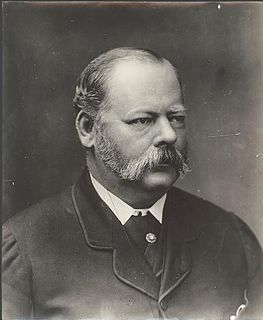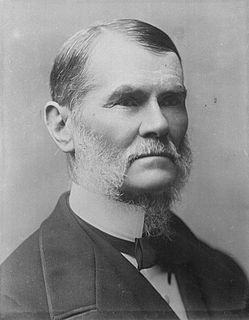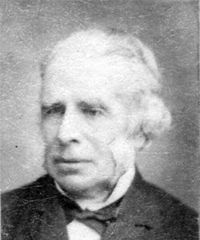Related Research Articles

Sir George Richard Dibbs KCMG was an Australian politician who was Premier of New South Wales on three occasions.

Sir Patrick Alfred Jennings, was an Irish-Australian politician and Premier of New South Wales.

Sir Alexander Stuart was Premier of New South Wales from 5 January 1883 to 7 October 1885.

James Squire Farnell was an Australian politician and Premier of New South Wales. Farnell was a hard-working legislator who gave much study to the land question and also tried hard for some years to pass a bill for the regulation of contagious diseases.

William Forster was a pastoral squatter, colonial British politician, Premier of New South Wales from 27 October 1859 to 9 March 1860, and poet.

Sir John Hay was a New South Wales politician.
Hastings was an electoral district of the Legislative Assembly in the Australian state of New South Wales from 1859 to 1880. It was abolished in 1880 as part of the first major redistribution since 1858, replaced by Hastings and Manning from 1880 to 1894, which elected two members with voters casting two votes and the two leading candidates being elected. In 1894 it was divided between the single-member electoral district of Hastings and Macleay and Manning. In 1920 proportional representation was introduced and Hastings and Macleay was absorbed into the new four-member district of Oxley. The electorate was named after the Hastings, the alluvial valleys of which contained most of its population.
United Counties of Murray and St Vincent was an electoral district of the Legislative Assembly in the Australian state of New South Wales from 1856 to 1859. It was named after Murray and St Vincent counties, including Canberra and Braidwood, although Braidwood and Queanbeyan were exclaves of the electoral district and formed parts of Southern Boroughs. Coastal St Vincent county were included in the electoral district of St Vincent. Its only member was William Forster. Murray and St Vincent was replaced by Queanbeyan and Braidwood.
Queanbeyan was an electoral district of the Legislative Assembly in the Australian state of New South Wales from 1859 to 1913, in the Queanbeyan area. It replaced parts of the electoral district of United Counties of Murray and St Vincent and the electoral district of Southern Boroughs. It was merged with the electoral district of Monaro in 1913, when much of its former territory had been absorbed in the Australian Capital Territory.

Geoffrey Eagar was an accountant and colonial politician and civil servant in New South Wales, Australia.
Members of the New South Wales Legislative Assembly who served in the eighth parliament of New South Wales held their seats from 1874 to 1877.</ref> The 1874–75 election was held between 8 December 1874 and 12 January 1875 with parliament first meeting on 27 January 1875. There were 72 members elected for 52 single member electorates, 6 two member electorates and 2 four member electorates. During this parliament the number of graduates of Sydney University exceeded 100 and the seat of University of Sydney was created. The maximum term of this parliament was 3 years and the assembly was dissolved after 34 months. Premiers during this parliament were Sir John Robertson 9 February 1875 till 22 March 1877 and from 17 August 1877 and Sir Henry Parkes 22 March 1877 till 17 August 1877. The Speaker was William Arnold until his death on 1 March 1875 and then George Allen.

The Treasurer of New South Wales, known from 1856 to 1959 as the Colonial Treasurer of New South Wales, is the minister in the Government of New South Wales responsible for government expenditure and revenue raising and is the head of the New South Wales Treasury. The Treasurer plays a key role in the economic policy of the government.
Joseph Michael Leary, was an Australian politician and solicitor, serving as a member of the New South Wales Legislative Assembly.
Murrumbidgee, an electoral district of the Legislative Assembly in the Australian state of New South Wales, has existed from the establishment of the Legislative Assembly in 1855 until its abolition in 2011.
James Watson was an Australian politician, Colonial Treasurer of New South Wales 1878 to 1883.

William Adams Brodribb was an Australian pastoralist and politician.
Henry Edward Kater was an Australian politician.
The Hastings, an electoral district of the Legislative Assembly in the Australian state of New South Wales was created in 1859 and abolished in 1880.
A by-election was held for the New South Wales Legislative Assembly electorate of Cootamundra on 28 July 1906 because of the resignation of John Norton (Independent). Norton blamed William Holman for an article in The Worker commenting on Norton's unnatural silence over the land scandals involving Paddy Crick and William Willis. Norton made a personal attack on Holman in parliament, challenging him to resign and both would contest Holman's seat of Cootamundra.
A by-election was held for the New South Wales Legislative Assembly electorate of Northumberland on 30 April 1880 because Thomas Hungerford resigned attend to personal business matters.
References
- ↑ Nairn, Bede. "Forster, William (1818–1882)". Australian Dictionary of Biography . Melbourne University Press. ISSN 1833-7538 . Retrieved 16 April 2019– via National Centre of Biography, Australian National University.
- ↑ "Mr William Forster (1818–1882)". Former Members of the Parliament of New South Wales . Retrieved 16 April 2019.
- ↑ "Writ of election: Murrumbidgee". New South Wales Government Gazette (39). 5 February 1876. p. 527. Retrieved 5 June 2021– via Trove.
- ↑ Green, Antony. "1876 Murrumbidgee by-election". New South Wales Election Results 1856-2007. Parliament of New South Wales . Retrieved 5 June 2021.